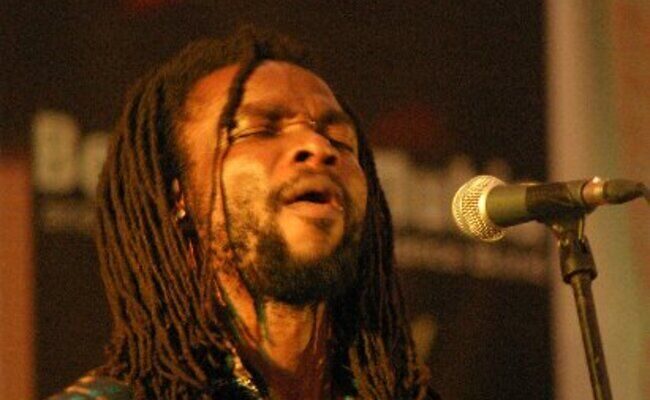With the escalating food crisis, insecurity, hunger, ill health, poor education and bad governance confronting many African countries, with Nigeria taking the lead, acclaimed folk singer and music composer, Olusegun Akinlolu (aka Beautiful Nubia), has called on the continent to take off the yoke of neo-colonisation if the desired progress and the needed development is to be achieved.
The eminent songwriter stated this on Sunday, March 19, while featuring on the Toyin Falola Interview Series chaired by the erudite professor of African history, Professor Toyin Falola, who was represented by Adepoju Oluwatoyin. The interview which was viewed by over 2.7 million people was streamed live via Facebook, Zoom, Telegraph, among other various social media platforms, and had prominent music lovers and critics such as Professor Tunji Azeez, Banning Eyre and Dr Temitope Fagunwa who were members of the panel.
According to Beautiful Nubia, the need to break free from self-serving predilections by those in power should be paramount. “Nigeria was colonized by some people for those of us who live there now. But we have never really claimed it. We love to blame those who created Nigeria and those who have continued to rape the African continent and take the resources whether human or material. But how much have we really tried to help ourselves. There are people who have stood up in the past to help us. But we would say that the West destroyed them. But how did the West destroy them? It was with the connivance of those here.

“In my new album, Olumuyiwa, I sang about a woman who was selling people in Lagos. At that point, the British said we are done with the slave trade. But this woman and people like her in the South-South insisted that they would keep selling slaves because it was the business they knew. This was how they made money, and they had no problem with selling their people. Today, African leaders have no problem selling their people. It is not just the leaders but all of us. If you put many of us in such position, we will do the same thing.
“We need to change everything about how we think. That is where I am, the revolution of the mind. We must change how people think and we have to start with young children. We will talk to the youths but they don’t often want to listen. But if you come to my shows, you will see them there. They listen to me. The adults, I think, are done for. But we can influence the little kids. I came up with what I got from ancient Yoruba traditions. What is the essence of a human being? What is your purpose here? Make your life a seed that you sow in this blessed earth. Water that seed all the days of your life until it grows into a mighty tree, thereby providing shade and sustenance for those coming after us. How do you achieve that? This is done by embracing Iwa which is the Yoruba code for character. Then there is truth. You must work. You must engage life with courage and bravery. You must have perseverance and patience. You must be humble. There must be contentment. You must teach that to people very early. It is the same way that we indoctrinate people with our religious beliefs that we can indoctrinate our children with these things. You end up with a group of people who are bent on building community over the self. It is not socialism; it is not communism. This is just basic, old African way of thinking which the Yoruba try to practice in those days.
“We have not tried to take off that yoke of neo-colonization. We are just going in the line that has been drawn for us. They taught us how to speak English. Since they taught us how to speak that language, we have just been talking and talking and talking and not doing. There are people who have tried to be proactive in time past. There was a government in the South-West of Nigeria. This was in the 50s and 60s. They did a lot in health care, agriculture and education particularly. That government wanted to lift the people. But do you know what we did? We conspired against them. Perhaps the time was not right then. Perhaps it is almost time. We are in serious crisis now. Perhaps the time is coming when this revolution of the mind will take root. I see it. Yesterday, somebody sent me a picture on instagram. He designed the picture and put in the code for a happy life. He listed them. I told people to frame it and put on their wall. This young man did and said that every morning when I am going out, I read this thing. That is how we start to change minds. We can have a mass of people who are thinking in a mass, progressive way. But you see our people are not ready to wait. That is the problem. We want to start on the same pedestal as the British and the Americans and be equal. But you have to do the work,” he said.
Earlier, he noted that the Nigerian condition could be stifling for an artiste in his ilk. According to him, “The Nigerian situation can be very stifling for a creative artist. It can make one give up. One of the most important things is not the structure. It is how the structures have made our people become very poor shadows of what their ancestors were. We are the point where it feels as though you are saying things and they are bouncing off the wall; you are not getting the response you would expect to get from the mass of the people. There are structures that have been put in place to ensure that anybody who wants to engage the people with intelligence and creativity gets shut down. There are impediments that are always put in your way.

“When I started out, they told me that you cannot play music that has serious content and expect to sell in Nigeria. They told me that “it doesn’t work that way. In this country, people just want to dance. They want to forget their problems. They don’t want to hear serious messages. If you want to get anywhere please play fuji or play juju.” These were the things that were dominant at the time. Now it is something else. It is what the kids are calling Afrobeats. And so, I was not signed by anybody. I was forced to become an independent artist which has been amazing and great for me. This is the only means by which I have been able to do everything that I have done because I don’t answer to anyone. I decide to record when I want to record. I am always hitting my head against that wall. The walls are there; the impediments are there. I take my band on road shows and tours in a country with no infrastructure. Sometimes, we play to a hundred or less number of people. People wonder how I am able to fund all of this. There is stubbornness about me and there is a sense that I also have that this is something that must be done, and we have to do it. We have to do what we can in our time while we still have the energy.
“I used to work as a veterinary doctor and I remember working with a company called Animal Care Services Consult. Our constant headache with dealing with the Nigerian systems was the inability to do honest business. It is very difficult to operate within the laws that the Nigerian system itself created. Even then as a Vet doctor, there were things that we dealt with. As a musician, it is even worse. Here you are working as an artist who is trying to stir people up and lift their consciousness. The barriers are there.”
He equally noted that despite not having the big endorsements from major companies, the sale of his music records has been footing his bills. “We have so many albums out there. People buy them. In actual fact, you might find out that some of the big names in the pop business have their audience listen to their music for free. With my music, you have to pay to listen most often. We make money from Apple music download. Our fans want to own the music. We have that hardcore group of fans who insist on buying. Our fans still buys CDs. Some of them are 19-year-olds. They buy CDs. When you come to our shows, you find people as many as 800, 1,000. They pay money and they spend money there. They buy my books, they buy our CDs. I am what I preach. I am a work in progress. I am not a finished work yet. When I tell people to be truthful, I try to be as truthful as possible. When I talk about contentment, I am the poster child of contentment. I learn to live within my means. I don’t peep over the wall to see what other people have,” he said.







